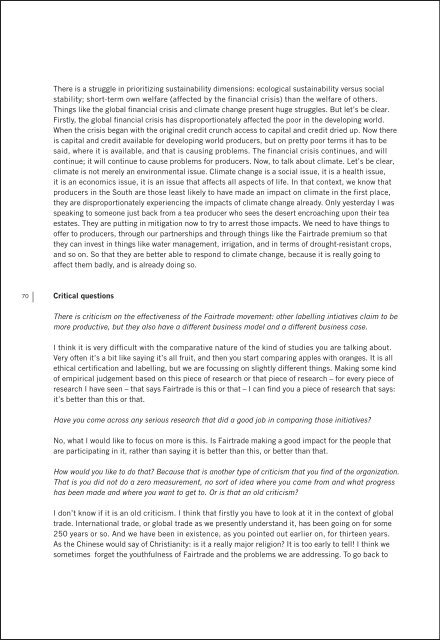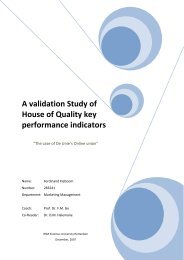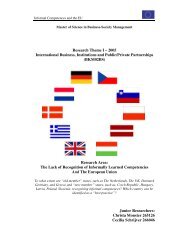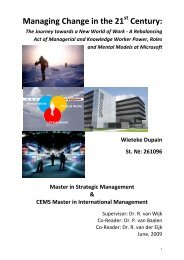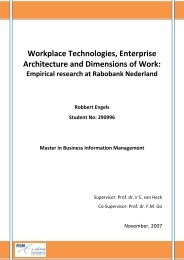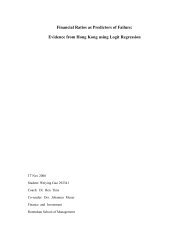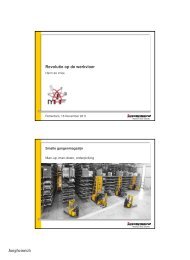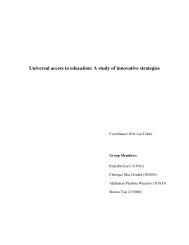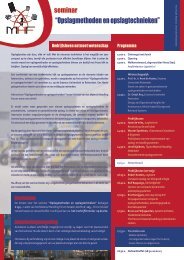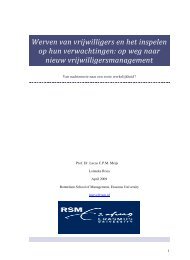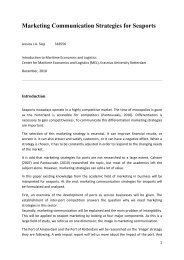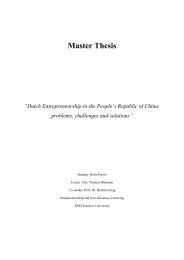Download With great power comes great responsibility (pdf) - ERIM
Download With great power comes great responsibility (pdf) - ERIM
Download With great power comes great responsibility (pdf) - ERIM
You also want an ePaper? Increase the reach of your titles
YUMPU automatically turns print PDFs into web optimized ePapers that Google loves.
70<br />
There is a struggle in prioritizing sustainability dimensions: ecological sustainability versus social<br />
stability; short-term own welfare (affected by the financial crisis) than the welfare of others.<br />
Things like the global financial crisis and climate change present huge struggles. But let’s be clear.<br />
Firstly, the global financial crisis has disproportionately affected the poor in the developing world.<br />
When the crisis began with the original credit crunch access to capital and credit dried up. Now there<br />
is capital and credit available for developing world producers, but on pretty poor terms it has to be<br />
said, where it is available, and that is causing problems. The financial crisis continues, and will<br />
continue; it will continue to cause problems for producers. Now, to talk about climate. Let’s be clear,<br />
climate is not merely an environmental issue. Climate change is a social issue, it is a health issue,<br />
it is an economics issue, it is an issue that affects all aspects of life. In that context, we know that<br />
producers in the South are those least likely to have made an impact on climate in the first place,<br />
they are disproportionately experiencing the impacts of climate change already. Only yesterday I was<br />
speaking to someone just back from a tea producer who sees the desert encroaching upon their tea<br />
estates. They are putting in mitigation now to try to arrest those impacts. We need to have things to<br />
offer to producers, through our partnerships and through things like the Fairtrade premium so that<br />
they can invest in things like water management, irrigation, and in terms of drought-resistant crops,<br />
and so on. So that they are better able to respond to climate change, because it is really going to<br />
affect them badly, and is already doing so.<br />
Critical questions<br />
There is criticism on the effectiveness of the Fairtrade movement: other labelling intiatives claim to be<br />
more productive, but they also have a different business model and a different business case.<br />
I think it is very difficult with the comparative nature of the kind of studies you are talking about.<br />
Very often it’s a bit like saying it’s all fruit, and then you start comparing apples with oranges. It is all<br />
ethical certification and labelling, but we are focussing on slightly different things. Making some kind<br />
of empirical judgement based on this piece of research or that piece of research – for every piece of<br />
research I have seen – that says Fairtrade is this or that – I can find you a piece of research that says:<br />
it’s better than this or that.<br />
Have you come across any serious research that did a good job in comparing those initiatives?<br />
No, what I would like to focus on more is this. Is Fairtrade making a good impact for the people that<br />
are participating in it, rather than saying it is better than this, or better than that.<br />
How would you like to do that? Because that is another type of criticism that you find of the organization.<br />
That is you did not do a zero measurement, no sort of idea where you came from and what progress<br />
has been made and where you want to get to. Or is that an old criticism?<br />
I don’t know if it is an old criticism. I think that firstly you have to look at it in the context of global<br />
trade. International trade, or global trade as we presently understand it, has been going on for some<br />
250 years or so. And we have been in existence, as you pointed out earlier on, for thirteen years.<br />
As the Chinese would say of Christianity: is it a really major religion? It is too early to tell! I think we<br />
sometimes forget the youthfulness of Fairtrade and the problems we are addressing. To go back to<br />
what I said earlier on, I am much more interested in developing more empirical research that shows<br />
Fairtrade and the progress the producers have made, but I am also interested in the kind of specific<br />
examples. Anybody that visits Fairtrade certified producers finds pretty much a similar story: that<br />
producers are enjoying substantial and demonstrable benefits from the engagement with Fairtrade –<br />
I see it again and again, at every producer I go and visit. Yes, there are criticisms, yes, there are<br />
problems, and no, we do not have a perfect system, and yes, we really must engage in a programme<br />
of continual improvement. We are not done with the standards and certification, but, anybody who<br />
goes and visits Fairtrade certified producers sees the benefit with their own eyes.<br />
South to South trade<br />
Fairtrade is at the moment a North-south activity. But we witness the growing <strong>power</strong> and importance of<br />
Southern economies like India, China, Brazil. Their multinationals are also active in developing<br />
countries. Are these countries an interesting target for the Fairtrade movement or will Fairtrade<br />
labelling be primarily aimed at ‘developed countries’?<br />
I think at the moment the Indian context is really very interesting for a number of reasons. Firstly,<br />
there is a growing consumer base in India. Secondly, there are some very, very poor producers in India<br />
that are selling their produce in the developed world. We have a lot of room for expansion there. One<br />
of the ways in which we can do that is what you might call South to South trade: Indian products sold<br />
on Fairtrade terms, in Indian markets. That is going to demand that we look at things very much in a<br />
local context; so in the same way as there is a version of Fairtrade that we may need to deploy for the<br />
Middle East, similarly we may need to look at it in a different way in India. I think we need to be open<br />
to those sorts of differences. Another example of that is what we are doing in South Africa. In South<br />
Africa we already have South African products sold on Fairtrade terms to South African consumers.<br />
It is going to happen in Kenya any minute now. These are the sorts of developments that I think bring<br />
more opportunities for producers, but they are also going to require that we reassess the model of<br />
Fairtrade, so that it works well in that local context. Rather than simply saying, well, this is how it<br />
works in the Netherlands, so therefore we can transfer it across to India, China, the Middle East or<br />
anywhere else.<br />
Power of Science<br />
What would be your shortlist of research questions for Fairtrade?<br />
There are most probably two areas. Firstly, longitudinal research on the impact of Fairtrade. We can’t<br />
look at what we didn’t look at fifteen years ago, but if you start now in five years time we might have<br />
some really solid longitudinal research. I think there is a real role for institutions like yours in that<br />
kind of area. Secondly, I think you mentioned the word ‘framing’ earlier on, and I am really interested<br />
in the directions in which consumers are framing the sustainability agenda, and in which business is<br />
framing the sustainability agenda. We cannot do enough, looking at trends and the directions in which<br />
this thing is going in, because I think the wind of change has moved and is in our favour. But that<br />
wind of change could prove to be fickle. We need to understand where it is going, both so we can<br />
respond to consumer interest and business needs, and also influence the direction in which it is<br />
71


